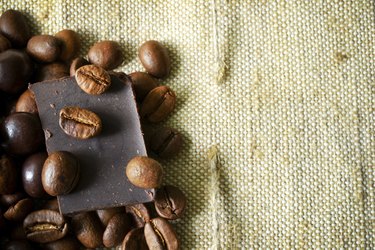
Chocolate-covered coffee beans contain caffeine that may help boost your energy. The caffeine boost comes not just from the coffee bean, but also from the cocoa bean found in chocolate.
Tip
A single ounce of chocolate coffee beans contains more than twice the amount of caffeine found in a cup of black coffee. The caffeine can offer an energy boost.
Video of the Day
Chocolate-Covered Coffee Beans
Both chocolate and coffee beans contain caffeine, so the specific amount of caffeine in coffee beans per gram varies depending on the brand and type of chocolate coffee bean. According to the USDA, one ounce, or 28 grams, of dark chocolate-coated coffee beans contains 237.9 milligrams of caffeine. These coffee beans also contain:
Video of the Day
- 153 calories
- 8.5 grams of fat
- 12 grams of sugar
One ounce of milk chocolate coated coffee beans contains slightly less caffeine, with only 227.2 milligrams, notes the USDA. These coffee beans are higher in calories, fat and sugar compared to the dark chocolate variety containing:
- 156 calories
- 9.4 grams of fat
- 14.4 grams of sugar
Both types of chocolate coffee beans contain more than double the amount of caffeine found in a single cup of black coffee, which has approximately 94.8 milligrams of caffeine, according to the USDA.
Espresso bean caffeine levels also vary. Espresso beans are a dark roast. Roasting doesn't significantly affect the bean's caffeine levels, but it does lower the acidity of beans, notes a June 2014 study in Food & Function. The decreased acidity may make chocolate-covered espresso beans a better option for some individuals.
Read more: The Effects of Eating Coffee Beans
Caffeine Benefits and Risks
Caffeine works as a stimulant on the central nervous system, advises the U.S. National Library of Medicine. For most people, consuming up to 400 milligrams of caffeine each day is safe for most people. Due to caffeine's effects, chocolate-covered coffee beans can be a delicious choice to overcome fatigue. Take care not to consume too many, especially if you drink other caffeinated beverages like coffee or tea.
Consuming too much caffeine can cause negative symptoms. These may include:
- Rapid heart rate
- Sleeping difficulties
- Anxiety
- Vomiting and nausea
- Tremors and restlessness
Excessive caffeine in your diet may also contribute to more serious conditions such as fibrocystic disease and osteoarthritis. If you consume 1,200 milligrams of caffeine or more in a short period of time, you may experience toxic effects including seizures and death, advises the Food and Drug Administration.
Other Benefits of Coffee
In addition to the caffeine energy boost, coffee contains many chemical compounds that may offer other health benefits and reduce the risk of several diseases. These benefits have been observed in studies of individuals who drink an average amount of coffee. The correlating benefits of eating whole coffee beans is unknown.
A review published in the November 2017 edition of the BMJ notes that some of the health benefits of coffee may include a decreased risk of:
- All-cause mortality
- Cardiovascular disease
- Certain cancers, including endometrial, prostate and liver cancer
- Gallstone disease
- Type 2 diabetes
- Parkinson's disease
- Depression
Read more: 14 Legit Ways Coffee Can Boost Your Health
Despite these benefits, coffee consumption may have negative effects on a pregnancy. These may include a higher risk of low birth weight and pre-term birth in the first and second trimester. Coffee may also increase the chance of developing of osteoporosis in women at risk for the condition.
- USDA: "Nutrition Facts for Dark Chocolate Coated Coffee Beans"
- USDA: "Nutrition Facts for Milk Chocolate Coated Coffee Beans"
- USDA: "Nutrition Facts for Coffee"
- Food & Function: "Variations in Caffeine and Chlorogenic Acid Contents of Coffees: What Are We Drinking?"
- U.S. National Library of Medicine: "Caffeine in the Diet"
- Food anad Drug Administration: "Spilling the Beans: How Much Caffeine Is Too Much?"
- BMJ: "Coffee Consumption and Health: Umbrella Review of Meta-Analyses of Multiple Health Outcomes"